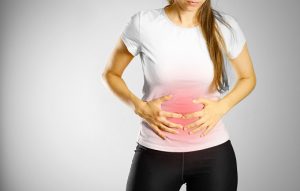 Collagenous colitis (CC) is a type of microscopic colitis (the only other type being lymphocytic colitis) whereby a layer of collagen forms inside tissue of the colon. Another definition of collagenous colitis is that it is a kind of inflammatory bowel disease. Sufferers of the condition may experience watery diarrhea and pain in the belly. This condition is much more prevalent among women than men; additionally, it generally affects those who are in their 50s. Cases of collagenous colitis are increasing in frequency, possibly due to better methods of diagnosing the condition.
Collagenous colitis (CC) is a type of microscopic colitis (the only other type being lymphocytic colitis) whereby a layer of collagen forms inside tissue of the colon. Another definition of collagenous colitis is that it is a kind of inflammatory bowel disease. Sufferers of the condition may experience watery diarrhea and pain in the belly. This condition is much more prevalent among women than men; additionally, it generally affects those who are in their 50s. Cases of collagenous colitis are increasing in frequency, possibly due to better methods of diagnosing the condition.
What are the causes and symptoms of collagenous colitis?
Collagenous colitis is caused by swelling and inflammation due to inflammatory cells traveling to the large, and sometimes small, intestine. If your large intestine is unable to properly reabsorb water, it causes the symptoms of collagenous colitis.
Advertisement
There are many factors that can contribute to collagenous colitis including a potential reaction to bacteria, pollen, or food. Certain medications may be triggers for CC, a list that includes nonsteroidal anti-inflammatory drugs (NSAIDs); antacids; antidepressants; diabetes medication; and cholesterol medication.
If you have diabetes, celiac disease, thyroid disease, rheumatoid arthritis, or irritable bowel syndrome, you may be at increased risk of collagenous colitis.
If you are experiencing intermittent episodes of watery diarrhea, you may have collagenous colitis. Other potential symptoms include loss of weight, pain in the belly, a bloating feeling, dehydration, nausea, fatigue, pain in the joints, and uncontrollable bowel movements.
How to diagnose collagenous colitis
Currently, the only method to diagnose collagenous colitis is by having a biopsy of the colon done. By examining tissue from the colon under a microscope, the doctor can make a diagnosis.
Initially, your doctor may perform a physical exam and ask questions about your symptoms in order to undercover other potential causes of your diarrhea. Procedures like a colonoscopy or endoscopy, as well as blood and stool tests, may be carried out. CT scans, MRI scans, and X-rays may also be used.
Treatment and recovery time of collagenous colitis
There are several different ways that collagenous colitis can be treated medically. Your doctor would likely examine any current medications that you take. Because some types of medicine can cause collagenous colitis, you might be advised to stop using certain prescriptions. There are also different medications that may be used to either treat symptoms or potentially cure your condition.
Surgery is rarely used to treat collagenous colitis. It is typically only a last-ditch option when changes to diet and medication do not work. This could involve a colectomy whereby part or the entire colon is removed, or an ileostomy whereby an opening in the abdomen is made after a colectomy.
Symptoms can be intermittent, with the time it takes to recover fully from collagenous colitis consisting of weeks or even years. If attempts to treat the condition are not consistent, symptoms may recur. Overall, regular treatment tends to help symptoms.
Diet to follow for collagenous colitis
The very first phase of treatment will involve dietary changes, such as learning which foods to avoid. A low-fat diet, not consuming products that contain caffeine and lactose, no longer using artificial sweeteners, employing a gluten-free diet, avoiding alcohol, and eliminating milk can all be helpful.
A reduction in fiber and fat intake can reduce incidences of diarrhea. Foods that are spicy can cause irritation to the digestive tract and should also be minimized.
Probiotics, which contain healthy bacteria, like Acidophilus, Florastor, and Culturelle, can help the colon’s bacteria balance.
Overall, increasing fluid take is important, as it will replenish water lost due to CC’s symptoms. Water or sports drinks (which contain electrolytes) are ideal to maintain hydration levels.
Prevention and prognosis of collagenous colitis
Advertisement
Completely preventing collagenous colitis is difficult, as the cause of the condition is unknown. Currently, treatment focuses on preventing symptoms from recurring.
Collagenous colitis is a bowel disease that is caused by inflammation and swelling due to inflammatory cells in the intestine. The only method to diagnose it is when a tissue biopsy is performed on the colon. Changes in diet, such as reducing fiber, fat, alcohol, caffeine, and milk products can be helpful. Regular fluid intake will counter the dehydration that comes with diarrhea. Symptoms may appear or disappear, but with consistent treatment, they can be mitigated. Surgery is only performed as a last resort.
Related: What causes painful colon spasms? Symptoms and treatment options
